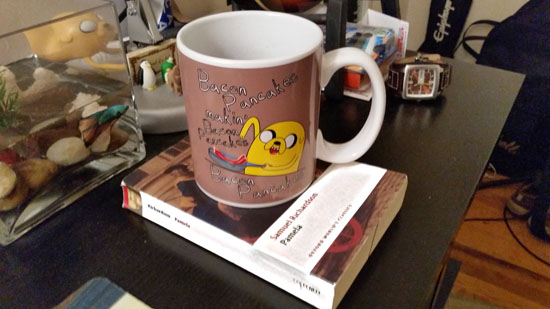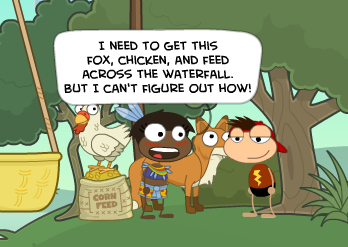So the bad news is that “the Master’s sister calls Pamela a whore” has completely hijacked the plot (or “plot”), and we’re on our third straight week of this scene, which Pamela somehow found time to write at some point in between all this being called a whore. The good news is I finally found a good use for my copy of Pamela! As a coaster for over-sized mugs! [Ariel says: Oh my god, you should start a home & style blog! I’d subscribe and definitely guest post. I sometimes use my old Requirements Engineering text book as a mousepad!]

Day 62 (Still… Again…)
You might recall Pamela is in the middle of recounting exactly what we just spent a week and a half reading:
“Her ladyship called after me; so did her woman, and I heard her say I flew like a bird, and she called two of her servants in sight to stop me, but I said, “Touch me at your peril, fellows!”
I don’t know what’s worse. Having to reread all of this all over again, having to reread the novel’s least believable scene all over again, or hearing Pamela spice up the story with quips she didn’t even say at the time. That continuity error is extra weird since we’re already supposed to suspend our disbelief that Pamela has been remembering ALL OF THIS word-for-word…
[Ariel said: Pamela’s memory sort of works like mine, I always think of the quip I should have said, and then I lie to myself to pretend it really did happen that way. The only difference is you don’t see me writing letters to people about it and changing my story mere pages later!]
Anyway, here’s today’s first dose of misogyny:
“I used to tell [our mother that my sister] would certainly beat her husband […] if he did not beat her first, and break her spirit.”
Ah, inside jokes with the parents about spousal abuse. Good times… good times…[Ariel says: Matt, I feel like you’re just not getting the joke. Like the *woman* is going to beat up the man unless he’s completely broken her spirit and ruined her first. A woman! Beating up a man! Before he beats her up first! Oh my god, I can’t stop laughing.
I actually know a really similar, equally hilarious joke that you’re all totally gonna love. Stop me if you’ve heard it before but it’s the one that’s like, “Oh my god, I’m going to kill myself unless someone breaks into my house and horrifically murders me in my sleep first.” Classic.]
The Master and Pamela leave and go home, so this day can finally be over, but Mrs. Jewkes tells them that the Master’s sister is still there and has gone to bed, because THIS SCENE WILL NEVER END.
Day 63 (Finally)
The Master and Pamela plan to sleep in until 8, but Lady Davers knows that the Master usually gets up at 6, and thus “got up soon after that hour [for] a whimsical scheme [to] find whether we were in bed together”. Apparently knocking on someone’s door before they wake up constitutes a “whimsical scheme”. Does it matter if he’s getting up later than usual if your plan is to just bother him before he wakes up? Where’s the scheme part of this scheme? [Ariel says: I personally can’t answer that question, but what I do know is that whimsical scheme is an amazing phrase and I cannot wait to use it in the future. If I can work it into my Divergent post on Thursday I’ll be so happy.]
Regardless, Lady Davers knocks on the door to see if Pamela and the Master are sharing a bed. The Master says there’s no problem with revealing this to her, because they’re married. So he lets her in and she freaks out because she was right, even though he is also right. I have no idea what anyone in this book is even trying to achieve anymore.
Anyway, here’s this book’s “man carries a protesting woman away because he’s done with her shit” dose of misogyny:
“Wicked abandoned wretch! Vile brother[!] I’ll tear the creature out of bed before your face, and expose you both as you deserve.”
At that point he took her in his arms, as if she had been nothing, and carri[ed] her out of the room.
As you might have gathered by now, the melodrama never ends. A ridiculous amount of conversation is devoted to how Lady Davers won’t eat breakfast without the Master, but the Master won’t eat breakfast without Pamela, but Lady Davers won’t eat breakfast with Pamela. It’s like the “you can only take the fox, the chicken, or the grain across the river one at a time” puzzle, but with more entitled white people.

Because conflict has to conveniently happen around Pamela for the story to happen, Lady Davers keeps ending up in contrived circumstances to continue fighting with the Master within earshot of Pamela.
She sat down and fanned herself, and burst into tears, and such sobs of grief [that] I sat down and trembled sadly.
If you ever find yourself required to read Pamela but don’t have time to read it or this blog, just assume that at any given moment someone is crying, and that Pamela is the most caring and selfless person who ever lived.
Not considering anything, I ran out of the closet and threw myself at my dear Master’s feet [and said], “Dearest sir, let me beg that no act of unkindness, for my sake, pass between so worth and so near relations. Dear, dear madam,” said I, and clasped her knees, “Pardon and excuse the unhappy cause of all this evil; on my knees I beg your ladyship”
If I had a dollar for every scene Richardson wrote where Pamela solves everyone’s problems by throwing themselves at their feet and pleading emotionally, I could hire someone else to write jokes about male gaze for me. [Ariel said: I like how it seems that Pamela either solves the problem by throwing herself at someone’s feet or running away in increasingly ridiculous ways.]
By this point, you might be thinking to yourself, “Holy fucking fucksicles!” (Or something) “When will this end already?” Well, the answer is never:
“Swear to me,” [said Lady Davers] “That Pamela Andrews is really and truly thy lawful wife”
[The Master] swore a solemn oath that I was. “And,” said he, “did I not tell you so at first?”
“I cannot yet believe you!” Said she.
THEN WHAT’S THE GODDAMN POINT OF ASKING?

So here’s the problem: The novel has a single remaining conflict, and the only resolution to that conflict is when a character suddenly stops believing it’s a conflict for some reason. The only thing stopping the plot (?) from progressing (???) at this point is waiting for her to be less stubborn, and the book has already thrown literally all the evidence that exists at her. This means that 1) this is going to feel cyclical and pointless, 2) what finally does get her to change her mind is going to be inherently contrived and out of nowhere, and 3) this is a really bad way to structure a narrative.

Lady Davers tries to play devil’s advocate by arguing that the Master would be super pissed at her if she married a lower-class person, to which the Master agrees, but mansplains that that’s totally different, because she’s a woman. And so, here’s today’s batch of, like, super misogyny:
“Where can the difference be between a beggar’s son married by a lady, or a beggar’s daughter made a gentleman’s wife?”
“Then I’ll tell you,” replied he, “the difference is a man ennobles the woman he takes, be she who she will, and adopts her into his own rank […] But a woman, though ever so nobly born, debases herself by a mean marriage, and descends from her own rank to his she stoops to.”

So can we give Pamela a pass since this technically was true of the sexist society that existed at the time? Sure, if there were literally anything else to this book. It doesn’t just reflect outdated sexism, it is outdated sexism. So that’s a “no,” then.
Dinner is somehow more melodramatic than breakfast, as the Master forces everybody to sit down together and serve themselves. So it basically looks like any dinner scene that would happen today, which ironically makes this the only scene that probably looked more batshit insane then.
The Master tries to make Lady Davers see his side of things, in much the same, completely non-self-aware way that randos on the internet try to explain that sexism isn’t real.
“Oh, Lady Davers! Were you a man, you would dote on [Pamela] as I do!”
Yes, that is how privilege works, Master.
Suddenly, Lady Davers drops some drama bombs, revealing that 1) the Master killed someone in a duel, and that 2) he had an affair with a lady once! Apparently the latter one was supposed to be a secret until now. The Master addresses these accusations, explaining that:
- Technically the guy died of a fever after they dueled and probably not of the wounds he received in the duel, and it’s okay because he wrote a letter to the guy’s parents explaining what a jerk he was. Phew! That clears that up!
- The Master explains “When I was at college” (which is way funnier nowadays than it probably sounded then) that he knew this lady of a slightly lower class who tried to golddigger her daughter on him, but her daughter was “not half so artful as her mother” and “yielded to my addresses before the mother’s plot could be ripened, and so utterly disappointed it”.

This last admission actually pains the Master, and he leaves. Lady Davers, amazed that the Master would admit these things to Pamela, suddenly realizes she was in the wrong and that the Master does truly love Pamela.
She was greatly moved at this, and the noble manner in which the dear gentleman owned and repented of his faults, and gushed out into tears, and said, […] “Pamela, I beseech you. My passion has carried me too far”
See? I told you it would be contrived and out of nowhere.
So the good news is that we’re finally done with out three week-long scene of the Master’s sister calling Pamela a whore. The bad news is next week is all about them trying to get the Master to stop pouting. Woo.
Question: What other alternate uses of books have you been guilty of? Unless they were like Pamela, because then it’s cool.



The fun answer to the “alternate use” question: it’s a pain in the ass to stick things to my apartment walls if the paper I’m putting up is even slightly curved, so I tend to flatten out my posters by unrolling them on the floor and covering them with the contents of my bookcase for a night.
The “I’m almost definitely going to Hell” answer to the alternate use question: I may or may not have once hollowed out a copy of the Catechism to use as a stash box because it was the only book I had that was big enough to hold everything I wanted to put in it. Catholic prep school was a really weird time in my life, I guess.
At least she hasn’t stripped and run out into the sea to try and solve things. Because that would just be stupid. Oh wait…
I think you misread this, Pamela isn’t a whore she’s a bore.
Aw snap
I LOL whenever you or Ariel use “mansplain”.
While I would like to believe this scene is totally antiquated , I think these attitudes still exist today. Maybe they are more hidden/unconscious, but I think they are still there.
“Where can the difference be between a beggar’s son married by a lady, or a beggar’s daughter made a gentleman’s wife?”
“Then I’ll tell you,” replied he, “the difference is a man ennobles the woman he takes, be she who she will, and adopts her into his own rank […] But a woman, though ever so nobly born, debases herself by a mean marriage, and descends from her own rank to his she stoops to.”
They definitely do. I thought about talking about it, but the post was already pretty long. And making “jokes” would have been hard.
Now I ain’t sayin she a gold digger.
I LOVE THIS BLOG!
I once used the contents of my bookshelf to make a fort… What can I say, I own a lot of books.
It was great though, because when I finished a book, I could just pluck another one from the ‘wall’.